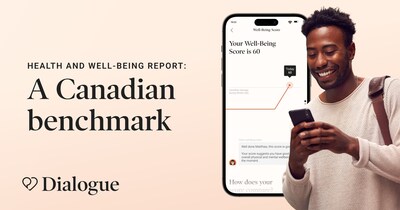Overall Canadian well-being remains low, especially impacted by financial stress, lack of sleep, and
activeness — but new report by Dialogue shows that nearly 8 in 10 are taking action.
MONTREAL, Nov. 19, 2024 /CNW/ - According to a new report published by Dialogue Health Technologies Inc., Canada's leading health and wellness platform, overall well-being, especially among working Canadians in their twenties, remains at a low point as they struggle with stress, particularly with financial pressures surrounding rising costs of living. These insights are assessed through Dialogue's Well-Being Score, which benchmarks thousands of people across the country every month.

The semi-annual Health and Well-Being Report: A Canadian benchmark leverages the World Health Organization's (WHO) Well-Being Index (WHO-5), uncovering insights across five dimensions of mental health and well-being, including mood, stress, sleep, activeness, and sense of purpose. Results show how Canadians' average well-being score has remained low over the past 18 months, with a score of 49.4 out of 100. With scores under 50 indicating poor mental health, the inaccessibility of traditional benefits leaves many at risk of developing more serious concerns if they are unable to improve their well-being.
With younger professionals facing a unique set of challenges and pressures, the report highlights how working Canadians aged 20 to 29 are scoring lower than any other age group. This can be explained by particularly low scores in sleep and activeness experienced by all age groups, a snowball effect stemming from financial pressures. Additionally, data from Dialogue reveals that Canadians are most often seeking financial support for budgeting, investing and retirement saving, and tax reduction — areas which can be heavily impacted by financial stress.
"With many Canadians losing sleep over common stressors such as finances, this has a cascading effect on lifestyle factors which impact mental health, physical health, and overall well-being," shared Dr. Marc Robin, Medical Director at Dialogue. "Increasing accessible support, especially through virtual means where mental health care is just a phone tap away, helps Canadians manage their health and well-being before issues worsen."
Encouraging Canadians to focus on prevention through employer benefits helps them take charge of their health by adopting trackable habits to improve their lifestyle. In fact, 8 in 10 people with access to Dialogue's Wellness program took action to implement a trackable lifestyle change after completing the Well-Being Score assessment. Benchmarking also directs employees to services available through employee assistance programs (EAPs), which include financial counselling and evidence-based stress management resources. This increases accessibility and awareness, promoting resources for issues that can be stigmatized.
As workplace benefits continue to evolve, working Canadians are increasingly willing to use them but often don't know what's available. When looking at more traditional models, over half (53%) of Canadians who have an EAP have never accessed it, despite EAPs including mental health and financial counselling. This is especially important as 1 in 2 Canadians believe their overall benefits plan doesn't meet their need, while 1 in 3 continue to view mental health benefits as insufficient.
A healthier workplace leads to benefits across the company, including long-term cost savings and the ability to attract and retain top talent. Organizations looking to enhance support for their employees are pivoting to virtual-first, accessible EAP models. Effective benchmarking tools, like Dialogue's Well-Being Score, allow HR leaders to leverage anonymous insights to tailor resources and strategies, enabling them to foster a stronger culture of well-being for healthier, more resilient teams.
About Dialogue's Well-Being Score
Dialogue's Well-Being Score leverages the World Health Organization's (WHO) Well-Being Index (WHO-5), one of the most widely used questionnaires to assess well-being in research. Available in English and French within the Dialogue app, the one-minute survey helps uncover insights across five dimensions of mental health and well-being, including mood, stress, sleep, activeness, and sense of purpose. Dialogue Well-Being Scores range from 0 to 100, with higher scores representing increased well-being, and scores less than 50 indicating the need for further mental health assessment. Following benchmarking, employees are empowered to take action through tailored in-app resources, which can include implementing a trackable healthy habit, consulting self-serve resources, and if they score low, consulting with a mental health professional. Data is aggregated and de-identified to show statistical trends, enabling employers to assess risk factors in their organization and proactively invest in employee well-being where it counts. The Health and Well-Being Report: A Canadian benchmark includes insights from assessments from 12,000 people across Canada from January 1st, 2024, to June 30th, 2024.
About Dialogue
Dialogue is Canada's premier virtual healthcare and wellness platform, providing affordable, on-demand access to quality care. Through its team of health professionals, it serves employers and organizations who have an interest in the health and well-being of their employees, members and their families. Dialogue's Integrated Health Platform™ is a one-stop healthcare hub that centralizes all programs in a single, user-friendly application, providing access to services 24 hours per day, 365 days per year from the convenience of a smartphone, computer or tablet. Dialogue is the first virtual care provider to receive the Accreditation Canada Primer award, a third-party validation of safety and high-level quality of care. In October 2023, Sun Life acquired Dialogue, which now operates as a standalone entity as part of Sun Life Canada. For more information, please visit the Company's website atwww.dialogue.co.
SOURCE Dialogue Health Technologies Inc.

 View original content to download multimedia: http://www.newswire.ca/en/releases/archive/November2024/19/c6147.html
View original content to download multimedia: http://www.newswire.ca/en/releases/archive/November2024/19/c6147.html